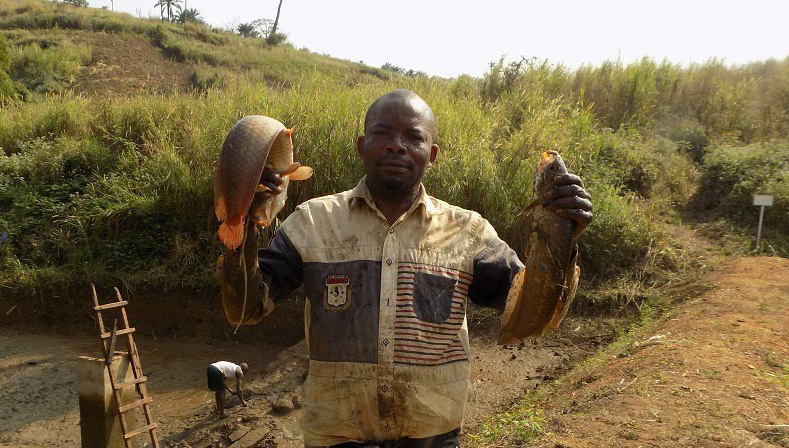BACKGROUND AND OBJECTIVES
 The Congo Fish Farming Project (Projet de renforcement des capacités des acteurs de la filière piscicole en République du Congo, RECAFIP), funded by the EU and implemented by APDRA Pisciculture Paysanne and the Congolese NGO Forum for the Promotion of Rural Groups (FPGR), is focused on fostering a sustainable and economically efficient fish farming sector in Congo. Its core aim is to enhance the capacities of local fish farming communities and authorities, bolster the region's fish production, and invigorate local supply chains.
The Congo Fish Farming Project (Projet de renforcement des capacités des acteurs de la filière piscicole en République du Congo, RECAFIP), funded by the EU and implemented by APDRA Pisciculture Paysanne and the Congolese NGO Forum for the Promotion of Rural Groups (FPGR), is focused on fostering a sustainable and economically efficient fish farming sector in Congo. Its core aim is to enhance the capacities of local fish farming communities and authorities, bolster the region's fish production, and invigorate local supply chains.
The Congo relies heavily on imported frozen fish largely due to insufficient local production. Therefore, the project's initial phase is dedicated to promoting local, fresh fish supply chains and enhancing the fish farming community's role in the local economy. The subsequent phase focuses on expanding fish supply and enhancing market fish quality in Congo.
ACTIONS
RECAFIP strengthens fish farmers' abilities by supporting them in their investment efforts, involving resource mobilization and development of environmentally sustainable economic activities. The project provides technical guidance to aid farmers in pond construction, encourages knowledge exchange, and promotes farmer empowerment. Farmer organization into groups promotes collaboration and knowledge sharing. Experience sharing, through both local and international trips (e.g. exchanges with farmers in Côte d’Ivoire), fosters a supportive community among fish farmers.
The project provides support for various fish farming techniques, including fry fish raising, fish feeding, water temperature management, and pond rice cultivation. The project also supports value chain improvement with collective fish transportation to nearby cities.
RESULTS
The first phase of the project supported 200 fish farmers, resulting in a 20 percent increase in fish production across 40 hectares of functional ponds. It also trained thirty women in fish marketing and collaborated with 20 local entrepreneurs providing essential services. Results include:
Social: The project strengthens capacities of 1,000 farmers, 20 farmer organizations, and numerous value chain actors. It also works to increase economic opportunities for women by designing fish marketing trainings targeted toward women. Additionally, with improved yields, local food security among fish farmers is improved.
Environmental: Emphasizing local resources usage, the project promotes the recycling of agricultural by-products (cassava, taro, sweet potato leaves) for pond fertilization. Integrating rice farming with fish farming enhances environmental performance, while the recycling practice eliminates greenhouse gas emissions. Additionally, the pond water can be used for other uses within the family farm, such as gardening or extensive pig or poultry farming.
Economic: The project aids small family farms in diversifying their income sources. Fish farming yields additional income and contributes to household food diversity (600 kg of fish per ha every 6 months). Multiple-species breeding (tilapia, catfish, heterotis, hemichromis)enhances pond productivity.
The project intervention takes place throughout the fish farming sector. Farmed fish, which represent only 0.5 percent of Congolese freshwater fish production, is usually sold directly near the pond. The development of farmed fish production contributes to the diversification of the local economy as it generates the emergence of different types of actors (service providers, traders) around this activity.
SUCCESSES AND LESSONS LEARNED
The project's approach centers on empowering fish farmers to invest in themselves, providing only advisory support and initial fingerlings for production. This fosters sustainable fish production as farmers can independently maintain their activities. Also, the international (APDRA) and local NGO partnership ensures project continuity.
However, this self-reliance strategy might limit inclusivity, as it requires early resource mobilization, which could burden women, youth, and insecure landowners disproportionately. To ensure inclusiveness, the project emphasizes collective pond construction and knowledge sharing. This project, rooted in climate science, underscores the potential of sustainable fish farming to reshape local economies while maintaining environmental integrity.

